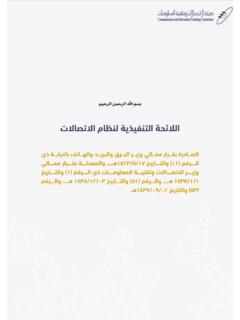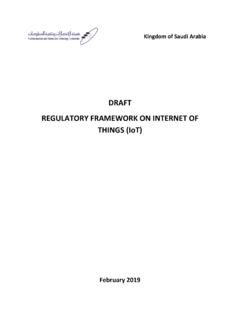Transcription of CITC Publications 2015
1 CITC Publications 75606 Riyadh 11588 Saudi Arabia Tel. +966114618000 Fax. +966114618190 Communications and Information Technology Communications and Information Technology Commission (CITC) would like to acknowledge all the organizations that participated in the studies conducted for this report. These organizations include government entities, organizations in various industries, and other stakeholders. The following organizations merit special mention for their contribution: Ministry of Communications & Information Technology (MCIT) Ministry of Economy & Planning (MEP) Ministry of Education (MoE) National Guard Health Affairs (NGHA) Riyadh Chamber of Commerce Human Resources Development Fund (HRDF) King Abdulaziz City for Science and Technology (KACST) King Abdulaziz University (KAU) King Fahd University of Petroleum & Minerals (KFUPM) King Saud University (KSU) Saudi Basic Industries Corporation (SABIC) Saudi Airlines Saudi Telecom Company (STC) Mobily Zain Al Rajhi Bank Ebtikar Arabia Ejada Systems Jeraisy Group Saudi Oger Ltd.
2 BT Al-Saudia Ericsson Hewlett Packard Huawei Microsoft Oracle Perfect Presentation (2P) SAP Samba Financial Group Tata Consulting ServicesACKNOWLEDGEMENTS5677791111111212 131415161718182022232325 EXECUTIVE SUMMARY1 ICT SECTOR DEVELOPMENT AND ITS IMPACT ON THE AVAILABILITY OF ICT SPENDING ON ICT, ITS ADOPTION, AND ITS IMPACT ON THE DEMAND FOR ICT THE IMPACT OF SKILLS SHORTAGE ON ICT FACTORS AFFECTING THE DEMAND FOR LOCAL ICT EMPLOYMENT2 ICT WORKFORCE EMPLOYMENT STATE OF ICT TEAMS3 ICT EMPLOYMENT ICT EMPLOYMENT DEMAND-SUPPLY DEMAND FOR AND AVAILABILITY OF ICT DEMAND FOR AND AVAILABILITY OF ICT SKILLS4 ICT EDUCATION5 RECRUITMENT AND RECRUITMENT OF ICT TRAINING OF ICT PROFESSIONALS6 AFTERWORDAPPENDICESAPPENDIX A: METHODOLOGYAPPENDIX B: DEFINITIONST able of Contents6 EXECUTIVE SUMMARYS audi Arabia has experienced rapid economic growth, guided by the vision of the Custodian of the Two Holy Mosques, King Salman bin Abdulaziz.
3 This growth, led by government-wide development effort, was reflected on the increased adoption and use of Information and Communications Technologies (ICT) in homes, businesses and government organizations, and resulted in increased spending on ICT products and services. In 2014, this spending reached an estimated SAR billion, solidifying Saudi Arabia s position as the largest ICT market in the Middle East. The local ICT market is expected to maintain its healthy growth to reach nearly SAR billion by 2017. Growing industries create a high number of new jobs that require advanced technical skills thereby putting pressure on domestic labor markets and technical education systems. Most developing countries, including the Kingdom, are experiencing a shortage of ICT skills, creating great challenges for governments and the private sector shortage of a sufficiently large and experienced national ICT workforce creates a dependency on foreign workers and raises ICT costs for both providers and consumers of ICT services.
4 This could hamper many private sector organizations that have weak internal ICT capability and make it difficult for them to build competitiveness and capitalize on the rapid growth in domestic and regional markets. CITC forecasts that the Kingdom s ICT workforce will increase to approximately 213,000 ICT professionals by 2017. Notwithstanding this increase, the Kingdom faces a cumulative shortage that will exceed 37,000 individuals between 2014 and 2017. The shortage of ICT professionals must therefore be addressed in a sustainable way through the development of the Saudi ICT talent pool, both in terms of quantity ( , the number of ICT graduates and professionals) and quality ( , the level of ICT and non-ICT skills they possess).The Kingdom should mobilize the local ICT workforce through close collaboration between the public and private sectors. Investment in recruitment, training and retention of Saudi national ICT workers should be further emphasized.
5 Moreover, the capacity of the higher education system needs to be bolstered through increased collaboration between policy makers, academia and the ICT industry. The overarching goal should be to increase the share of Saudi nationals in the ICT workforce and improve the quality of their SECTOR DEVELOPMENT AND ITS IMPACT ON THE AVAILABILITY OF THE ICT ON ICT, ITS ADOPTION, AND ITS IMPACT ON THE DEMAND FOR ICT SKILLSS purred by growing adoption of Information and Communications Technologies (ICT) by both individuals and organizations, spending on ICT has been growing at a rapid pace in Saudi Arabia. The Saudi ICT market surpassed SAR billion in 2014, cementing the position of the Kingdom as the largest ICT spender in the Middle East. ICT spending is expected to reach SAR billion by by individuals comprises more than half of the Kingdom s ICT spending, and the growth in this segment is mainly driven by increased demand for mobile and portable devices such as smart phones and tablet As was informed by CITC s ICT Report on Mobility in Saudi Arabia, a significantly high proportion (82%) of mobile users in the Kingdom have access to either smart phones or tablet The Kingdom currently has nearly 8 million Facebook users, over 1 million LinkedIn users, over 5 million Twitter users, and over 90 million YouTube videos viewed The explosive growth in the use of applications and social media, and the need for ubiquitous access to communication networks and applications are boosting the demand for mobile and portable organizations, in both the private and public sectors, are rapidly increasing their spending on ICT.
6 Spending on computers, enterprise networks, servers and storage systems, and software applications has seen significant growth over the past few years. There is now a growing demand for services related to the design, installation and maintenance of these systems. This proliferation of devices, systems and applications has resulted in an unprecedented growth in enterprise data volume. These factors, coupled with a need for greater communication and collaboration, have boosted the demand for connectivity, bandwidth and enterprise telecommunication services. This growth in ICT spending will create new ICT jobs, and the need for a large local ICT workforce to fill these positions. THE IMPACT OF SKILLS SHORTAGE ON ICT OPERATIONSLack of ICT skills can lead to reduced efficiency and higher ICT costs, and in turn, undermine competitiveness. More than 40% of organizations surveyed by CITC agree that a lack of ICT skills in the Kingdom has a significant impact on ICT operations, while 44% say that a lack of ICT skills has significant bearing on wider organizational 1 CITC ICT Indicators Report, End of Q4 2014, and IDC Blackbook, Q3 20142 IDC Blackbook, Q3 20143 CITC ICT Report on Mobility in Saudi Arabia, 20154 The Social Clinic.
7 The State of Social Media in Saudi Arabia, 20148operations and performance (Figure 1). A shortage of skills will prevent organizations and sectors with intensive ICT operations from expanding availability of a reliable national pool of skilled ICT professionals is critical to the building of sustainable ICT industries. Lack of skilled ICT professionals discourages foreign ICT companies from establishing presence, and local telecommunications operators and IT providers from expanding operations in the Kingdom. In the absence of a sufficiently large local ICT workforce, there will be increased pressure to bring in expatriate workers to fulfill the demand. Figure 1: Effect of ICT Skills Shortage on ICT Operations 5 5 2014 CITC Saudi Arabia ICT Workforce Skills Survey, n=4135%strongly disagree18%somewhat disagree36%neutral21%somewhatagree20%str onglyagreeLack of ICT skills in the country has a significant effect on ICT operations in our organization4%strongly disagree25%somewhat disagree27%neutral28%somewhatagree16%str onglyagreeLack of ICT skills in the country has a significant effect on operations and performance in our AFFECTING THE DEMAND FOR LOCAL ICTEMPLOYMENTA Push for Saudi Nationals in the ICT WorkforceThe ICT workforce in the Kingdom has a large representation of expatriate The enforcement of Nitaqat regulations is expected to persuade organizations to hire more Saudi nationals.
8 Further increasing the proportion of Saudi nationals in the ICT workforce may take some time, as it requires: Increasing the number of Saudi students in the ICT specialties; Training a number of workers currently working in other fields, and facilitating their movement into ICT jobs; Training cadres who are currently unemployed on the requisite skills for entry into the ICT the interim, however, the shortage could lead to difficulty and delays in hiring, and possibly, some salary inflation in the short term as organizations compete with each other to bring on board the best and most suitable Saudi local ICT workers. However, in the long term, the three aforementioned initiatives are expected to create an even larger and more capable Saudi local ICT workforce, and eventually, mitigate the effects of salary of Cheaper ICT Delivery OptionsIn order to reduce ICT costs, many organizations prefer to outsource to offshore providers. In the modern, globalized ICT delivery environment, it is possible to effectively consume ICT services from remote locations at acceptable quality levels.
9 Providers that have resources based in cheaper locations can often offer services at relatively lower costs than providers who are fully based onshore. Cloud computing also offers cheaper options for ICT services, and typically requires a relatively smaller number of workers within the customer organization. Alignment of University CurriculaHigher education institutions such as universities and training institutes play the critical role of supplying skills and adding individuals to the ICT workforce. These institutions in Saudi Arabia sometimes face criticism that their curricula do not match the needs of the industry, and that, as a result, their graduates are not job-ready. This criticism of higher education institutions persists in most countries. Furthermore, there is a view that while the premier institutions are renowned for their high quality ICT education, the lower tier institutions have relatively lower quality level.
10 It s important to understand that educational institutions cannot by themselves fully address the skills supply gaps. Both the higher educational institutions and the industry in the Kingdom will benefit much by working closely with each other to train and develop skilled Focus on ICT Skills DevelopmentThe National Communications and Information Technology Plan (NCITP), issued by the Ministry of Communications and Information Technology (MCIT), recognizes the ICT skills challenge, and states that one of its objectives is to prepare the Kingdom s manpower for ICT jobs through ensuring proper utilization of ICT at all levels of education and training, and through the provision of qualified, trained human capabilities in various ICT disciplines. 76 Ibid. 7 Saudi Arabia Ministry of Communications and Information Technology, National Communications and Information Technology Plan: A Vision towards the Information Society, the years, a number of initiatives have been launched by the government to boost the local skilled ICT workforce.








